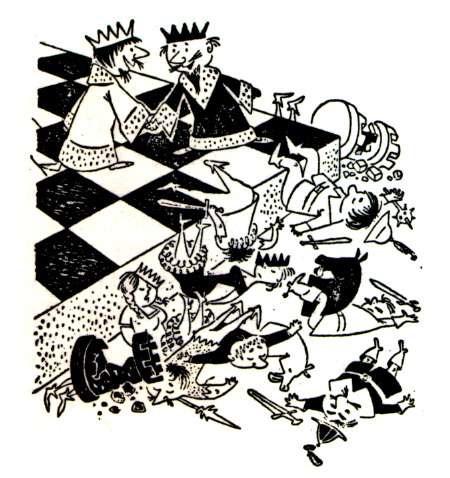I played in my first USCF-rated tournament this weekend and it was everything I had hoped it would be. I met some nice people, played some good games and actually won a bit of money. I showed up Friday night at the LAX Radisson for my first game, took the elevator up to the penthouse (no, really) and strolled into the tournament hall overlooking the LAX runway. I checked my board assignment (#19, my lucky number) and walked down the hall to meet my opponent. I walked past IMs and GMs setting up classical Staunton pieces on their wooden boards and Expert players fixing the time controls on their Chronos clocks. As I neared the end of the hall and mingled among the other amateur players, disaster struck. My nightmare became reality. I was going to be playing a little kid. And not just any kid. A glasses-wearing, fedora-sporting nine-year-old named Gatlin Scott Black. No matter the result, I knew there was no pride to be gained from this game. I win and I just beat a nine-year-old in a game of chess. Props to me. I lose and I just got whooped by a nine-year-old.
The tournament director comes in and announces that we can start our games. Gatlin’s mom wraps him in a blanket, hands him a baggie of snacks and gives him a good luck kiss. The game starts and proceeds in a surprisingly normal fashion. Standard opening, standard development, but the whole time I’m just thinking to myself “I’m playing a nine-year-old in a tournament-rated game of chess. I’m essentially playing against my baby sister.” Around move 20 (that’s a lie, it was move 12), I notice Gatlin eyeing my king and mouthing something to himself. It took me a moment, but I realized he was calculating something. I look at my king and then at his queen, his knight, his bishop. And then I see it. Bishop sacrifice...shit. He reaches his tiny little hand out and plants his bishop right next to my king. Check. Almost as if on cue, the whole tournament hall seems to migrate towards our game. One by one, the other players in the hall look at the board, look at me and smile that all-knowing smile. I’m getting beaten by a nine-year-old, they know it, and they want me to know that they know it. Well, I’d had enough. I played the only move available to me and took a walk. I strongly considered disappearing, never to be heard of in the chess world again.But instead I consoled myself with the fact that even though I was losing our chess game, I could still kick Gatlin’s ass in a fight. His pint-sized fists were no match for me.
When I got back to the board, I defended for ten moves or so and somehow managed to equalize the position. Around this time, Gatlin got into time trouble. He spent about 30 minutes thinking about a move, and only had 8 minutes to make 16 moves. He became visibly nervous, blundered a piece and I started to win. Another ten moves and he resigned. But here’s the really awful part. He offered me a draw while the position was still equal and I declined. I looked at his clock, saw how little time he had, and consciously decided that I could probably beat him just because he didn’t have enough time to properly think. And I was right. Both about the game and the absolute lack of pride that I would feel by winning it. But I did learn a couple things from that game. First, I’m a terrible person. And second, age doesn’t have too much to do with skill in chess. Just because my opponent is young, I shouldn’t go easy on him because he’ll just end up surprising me with a nice combination and wiping the board with me. That latter point really came in handy during my final game of the tournament...against a six-year-old.

